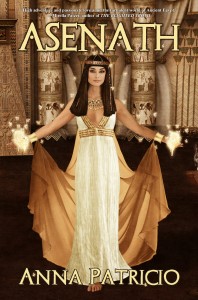Today, I welcome fellow historical fiction author Anna Patricio to talk to us about a period of Egyptian history I don’t know as well as I’d like to. Anna is a fellow lover of ancient history, with a particular interest in Egypt, Israel, Greece, and Rome. Her recent novel, Asenath, delves into the biblical story of Joseph. Let’s hear what she has to say. Anna, take it away.

Two Destinies...One Journey of Love. In a humble fishing village on the shores of the Nile lives Asenath, a fisherman's daughter who has everything she could want. Until her perfect world is shattered. When a warring jungle tribe ransacks the village and kidnaps her, separating her from her parents, she is forced to live as a slave. And she begins a journey that will culminate in the meeting of a handsome and kind steward named Joseph. Like her, Joseph was taken away from his home, and it is in him that Asenath comes to find solace…and love. But just as they are beginning to form a bond, Joseph is betrayed by his master’s wife and thrown into prison. Is Asenath doomed to a lifetime of losing everything and everyone she loves?
My novel ‘Asenath’ is about the Egyptian priestess who marries Joseph of the multicoloured coat fame.
I love the story of Joseph, hence my novel on his little-known wife. When I began delving deeper into his story some years ago, I was amazed to come across comparisons made between his story and various tales from Egyptian mythology. I always thought I knew the Genesis account and Egyptian myths pretty well, but I never thought to draw parallels between the two. I found these to be really insightful. Plus, being a mythology aficionado, my interest was duly piqued.
Possibly the most widespread comparison made was that between the Potiphar’s wife episode and the story of the two brothers, Anubis and Bata. As we know, in the Biblical account, Joseph fled the advances of his master’s wife, yet suffered unjustly. In the Egyptian myth, Anubis’ wife too tries to seduce Bata while her husband was out. Like Joseph, Bata spurned her. And like Mrs. Potiphar, Anubis’ wife falsely cried rape, and her husband sought to kill Bata.
The similarities do not end there. Joseph and Bata are long-suffering heroes. As we know, Joseph was in prison for many years until he interpreted Pharaoh’s dreams and was appointed vizier of Egypt. Bata, too, endures a lot but becomes a ruler in the end–a Pharaoh, at that.
Basically, after hearing his wife’s false accusations, Anubis goes after Bata to kill him. The gods then create a river between the two brothers, protecting Bata. When Anubis goes home, he found his wife duped him, and thus kills her. Meanwhile, the gods give Bata a wife. Alas, she is not faithful to him. When she catches Pharaoh’s eye, she marries the king and has her first husband killed.
Bata, however, is reincarnated several times–and murdered several times as well. Eventually, he is reincarnated as his wife’s son (this is made possible when, as a tree, he is cut down and a small chip flies into his wife’s mouth). When he grows into manhood, he is able to get his revenge and then rules Egypt together with his long-lost brother.
There is also a little-known episode of Joseph which takes place during the Exodus. Most people do not seem to be aware of this, probably because it is mentioned in passing, but when the Israelites left Egypt they brought the bones of Joseph with them. There is an interesting rabbinical story in which Moses, before leaving Egypt, calls on Joseph’s coffin which is apparently buried in the Nile. Joseph’s coffin rises up, and Moses then collects it.
This has been likened to the tale of Osiris. As you probably know, Osiris was murdered by his jealous brother Seth and was placed in a coffin, which was then dumped into the Nile. Osiris’ wife Isis went searching for him and later found him.
So, Joseph likened to Bata and Osiris. Intriguing stuff, indeed.
It is really interesting what you find out about these famous Biblical tales when delve deeper into them. There have been so many folktales (or midrashic stories) based on them, so many comparisons drawn with famous myths – the possibilities are boundless and quite astonishing. Thank you for giving me the opportunity to do a guest post on your blog, Ms. Dray!



There is a belief that Judaism sprouted from monotheistic Egypt, plus with the Jews exile there it can only make sense that there’d be similarities.
Wow! I didn’t know Joseph was married.
LOL, Elisa, I get that all the time. Even I didn’t know Joseph got married until I delved deeper into his story.
Very interesting.
I did not know the Anubis story at all.
I have an interesting dream to relate to you, if you wish to contact me.
I am not crazy, just a little empathic.
Thanks
Suzy
i like the Joseph he was a governor and a prime minister of Egypt a prince of Egypt and a hero he came into deep connection with the supernatural i want to know that guy actual name people says he went to America i want the whole story about Joseph